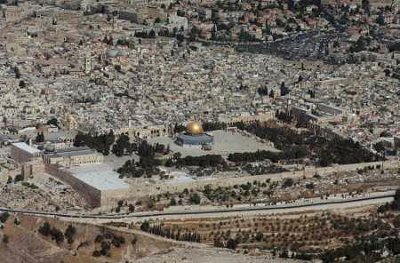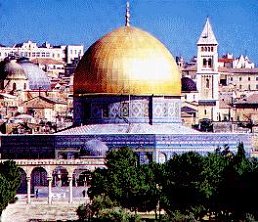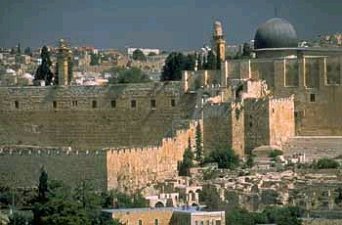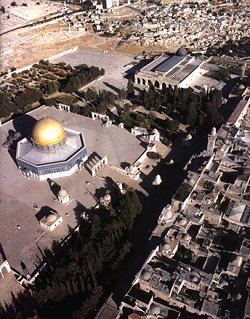The ancient Biblical hill known as Mount Moriah has always been at the center of Jewish history. Today it remains at the center of the supernatural warfare between Jehovah and Lucifer. Mount Moriah (purchased by King David from Ornan the Jebusite) is the very hilltop where the Lord led Abraham to offer his son Isaac, and also the spot where God later permitted Solomon to build a House for the Lord. It is also the place that stands at the forefront of the events of the Apocalypse, and ultimately to the coming of the conquering Christ. But today, Allah alone stands enshrined in the only house on Mount Moriah. Today Israel is yearning for a presence on the Mount also, and one day soon will be provided with such an arrangement by the Antichrist.
Thus the reason for the modern cataclysmic conflict that is raging between the Muslim world and Israel within the context of the Israeli-Palestinian Conflict, and the world's ongoing Partitioning Plan that is supposed to be a solution to the highly volatile issue surrounding Jerusalem and the Temple Mount. The political status of the Temple Mount in is the subject of final status negotiations between Israel and the Palestinians.
 Luke 21:20-24 And when ye shall see Jerusalem compassed with armies, then know that the desolation thereof is nigh. Then let them which are in Judaea flee to the mountains; and let themwhich are in the midst of it depart out; and let not them that are in the countries enter thereinto. For these be the days of vengeance, that all things which are written may be fulfilled. But woe unto them that are with child, and to them that give suck, in those days! for there shall be great distress in the land, and wrath upon this people. And they shall fall by the edge of the sword, and shall be led away captive into all nations: and Jerusalem shall be trodden down of the Gentiles, until the times of the Gentiles be fulfilled.
Luke 21:20-24 And when ye shall see Jerusalem compassed with armies, then know that the desolation thereof is nigh. Then let them which are in Judaea flee to the mountains; and let themwhich are in the midst of it depart out; and let not them that are in the countries enter thereinto. For these be the days of vengeance, that all things which are written may be fulfilled. But woe unto them that are with child, and to them that give suck, in those days! for there shall be great distress in the land, and wrath upon this people. And they shall fall by the edge of the sword, and shall be led away captive into all nations: and Jerusalem shall be trodden down of the Gentiles, until the times of the Gentiles be fulfilled.
Islam Was Born 700 Years After Jesus
In the 7th Century A.D. a new religion suddenly burst upon the world scene. That new religion, as conveyed by Mohammed was the religion of Islam The prophet Mohammed was born in Mecca about 570 A.D. After receiving profound revelations supposedly from an angel, (supposedly Gabriel) and stirred by the polytheistic paganism of the Kaaba shrine worship, Mohammed, rejected by his people, began his Hijra (migration) from Mecca to Medina. The Hijra that Mohammed undertook in 622 marked the beginning of the Islamic era. Two years later Mohammed's followers defeated the ancient Meccans at the Battle of Badr and finally in 630 Mecca itself was conquered by Mohammed, who transformed Mecca and its Kaaba into the spiritual center of Islam. Mohammed died in 632 and was succeeded by Abu Bakr as the first caliph. The official version of the Koran was established in 650 during the reign of Uthman, 18 years after the prophet's death. By 656 a religious civil war arose within Islam among the "descendants" of Mohammed, disputes as to who was the legitimate, appointed heir to the fait, and held the rightful place of Mohammed. Modern Shi'ite extremism in the Middle East is a holdover of this religious revolution that actually began in 685. These religious fissures persist to the present day, resulting in Islam being a divided religion.
Then in the years between 633-63, the Arabic Muslim tribes conquered Syria and Iraq, soon followed by Egypt, and then finally Persia in 640-643. Muslims believe that the conquest of these countries was Divinely granted unto them by Allah. Not long thereafter, the Arab/Muslim armies moved into the Holy Land and were able to take full control of the city of Jerusalem by 638.
The Historian Steve Runciman later recounted the historic conquest of Jerusalem:
 On a February day in the year A.D. 638 the Caliph Omar entered Jerusalem, riding upon a white camel. He was dressed in worn, filthy robes, and the army that followed him was rough and unkempt; but its discipline was perfect. At his side was the Patriarch Sophronius, as chief magistrate of the surrendered city. Omar rode straight to the site of the Temple of Solomon, whence his friend Mahomet had ascended into heaven. Watching him stand there, the Patriarch remembered the words of Christ and murmured through his tears: 'Behold the abomination of desolation, spoken of by Daniel the prophet.' On a February day in the year A.D. 638 the Caliph Omar entered Jerusalem, riding upon a white camel. He was dressed in worn, filthy robes, and the army that followed him was rough and unkempt; but its discipline was perfect. At his side was the Patriarch Sophronius, as chief magistrate of the surrendered city. Omar rode straight to the site of the Temple of Solomon, whence his friend Mahomet had ascended into heaven. Watching him stand there, the Patriarch remembered the words of Christ and murmured through his tears: 'Behold the abomination of desolation, spoken of by Daniel the prophet.'
Omar is reported to have been utterly shocked and dismayed at the filth and rubble that lay strewn about the Temple Mount. He had hoped to take the site as a religious trophy. But because the holy site had been so neglected, he made the Christian Patriarch Sophronius grovel in the muck. Later Omar set about clearing the site and building a wooden mosque on the compound.
One well-known historical account contains the following details:
The great mosque of Jerusalem, Al Masjid al Aksa, the " Further Mosque," derives its name from the traditional Night Journey of Muhammad. (Kuran xvii. 1): "I declare the glory of Him who transported His servant by night from the Masjid al Haram (the Mosque at Makkah) to the Masjid al Aksa (the Further Mosque) at Jerusalem," the term "Mosque," meaning the whole area of the Noble Sanctuary, and not just the building of the Aksa, which in Mohammed's days, did not even exist.
According to the mythological, but official religious account, Muhammad on this occasion was mounted on the winged steed called Al Burak (the Lightning) and, together with the angel Gabriel for an escort was carried from Makkah (Mecca), to the Sinai, and then to Bethlehem, after which they came unto Jerusalem. "And when we reached Bait al Makdis, the Holy City," so goes the legend, "we came to the gate of the mosque, and here Jibrail (Gabriel) caused me to dismount. Entering the Mount Area by the gateway, afterwards known as the Gate of the Prophet, Muhammad and Gabriel went up to the Sacred Rock, which of old times had stood in the centre of Solomon's Temple. Supposedly, Muhammad proceeded to perform his prayer-prostrations, and then ascended, by a ladder of light, up into heaven. Muhammad ultimately stood in the presence of Allah, receiving instructions for his return again to earth. The return journey homeward was made after the same fashion, on the back of the steed Al Burak and the Prophet reached Makkah again before the night had waned.
After the capitulation of Jerusalem to 'Omar in 635, that Khalif caused a mosque to be built on what was considered to be the ancient site of the Temple of David. The traditional position of the ancient site was established by Omar, through the discovery of a Rock concealed under a dunghill from the description that had been given to him through inspirations from Mohammed. Mohammed's spirit pinpointed the place where he had made his prayer prostrations in Jerusalem on the occasion of his Night-Journey.
The Muslim Dome of the Rock is Built on the Temple Mount
In about the year A.D. 691, the Caliph Abd el-Malik commissioned the best architects to build the Dome of the Rock. His plan was based upon a Fourth Century Christian shrine erected on the Mount of Olives supposedly marking the site of Jesus' Ascension. The Caliph's new Islamic shrine was deliberately built as a political, economic, and religious counter attraction to Mecca. Medina and Mecca, the two Saudi Arabian cities holy to Islam, were under the control of a rival Caliph. Caliph Abd El-Malik sought to establish the importance of Jerusalem as an Islamic center for pilgrimage and worship. Ironically, the holiest spot in all of Judaism, the place Jehovah had taken for his name, was now to be identified with the spot where Mohammed's horse mysteriously ascended to heaven.
The truth of the matter is that Jerusalem was not considered of great importance to the Muslim armies, and that is revealed by the fact that it was one of very last cities taken by the Syrian Muslims after the death of Mohammed. Even more revealing is the fact that Mohammed never expressed any interest in conquering Jerusalem, although he had supposedly leapt into Heaven from there. It was finally conquered by a low ranking Muslim commander, and not by Omar himself. The Arabs first called the city Ilya, after the Roman name (Aelia Capitolina) rather than Beit el-Maqdas (the holy house). An early Muslim proverb says, "One prayer in Mecca is valued as ten thousand prayers; a prayer in Medina is valued at one thousand prayers; and a prayer in Jerusalem is worth only five hundred prayers." Although Caliph Abd El-Malik was the one that actually commissioned the structure, it became known as "The Mosque of Omar." The building is not today, nor has it ever been a mosque, but is rather an Islamic shrine. (Omar was the second Caliph of the four patriarchal Caliphs of Islam. A caliph is a successor to the Prophet and the head of the Muslim community. He was the most notable figure of Islam.)
Beneath the glimmering Dome of the Rock structure is an outcropping of the bedrock of Mount Moriah. The outcropping is known as the "Sacred Rock." On the rock's pock-marked surface is one particular indentation which is reputed by Muslims to be the footprint left by Mohammed as he leapt into heaven. Mount Moriah is the same hill ridge that is the traditional site of Abraham's sacrificial altar for Isaac, the site of the threshing floor or Araunah, and most importantly, the site of the First and the Second Jewish Temples.
Beneath the Dome of the Rock is a cave. The cave is known as "the well of souls”. Muslims call this cave the "well of souls" because they believe the dead meet twice a week to pray there.
 Recently, in 1993, a million dollars in gold foil was provided by the government of Saudi Arabia as a gift to cover the Dome. Recently, in 1993, a million dollars in gold foil was provided by the government of Saudi Arabia as a gift to cover the Dome.
The Dome of the Rock Symbolizes Islamic Rebuttal of Christianity
From the Muslim point of view the Dome of the Rock was an answer to and a denial of the attractions of Christianity and its Scriptures, providing Muslims with arguments to be used against Christian theology. The inscriptions on the Dome of the Rock structure are seven hundred and thirty-four feet long in all, amongst the lengthiest inscriptions in the world. Most of the quotations of course come from the Koran.
Jewish Life Under Muslim Rule
The conquering Muslims brought a different attitude with them. In contrast to the Byzantine and Roman conquerors who let the Temple Mount remain in ruins as a proof of the destruction of Jewish nationalism, the Muslims restored worship to the Mount. Yet the worship was not of Yahweh, the God of the Bible, but of Allah. When the Muslims became the rulers in Jerusalem some matters became easier for the Jews. They were officially allowed to live in the city and there is evidence that on certain holy days they were even permitted on the Temple Mount.
Historic accounts say that the Jews would march in procession around the walls of the Temple Mount on feast days and pray at the gates. A document written in the tenth century indicates that one of the conditions for allowing the Jews to pray at the gates was that the Jewish community would be responsible for keeping the Mount clean. The Jews, the document states, were responsible to sweep the Mount.
The European Crusaders Temporarily Capture Jerusalem
Over the course of the last 1300 years, the Temple Mount has primarily been in the hands of the Muslims. However, on July 15, 1099 Jerusalem was taken away from the Muslims by the Roman Crusaders from Europe. The Crusaders slaughtered the inhabitants of Jerusalem in an unjustified carnage. The Dome of the Rock was then converted into a Catholic Church called the Templum Domini, or "Temple of our Lord." The Crusaders then began to use the Al-Aksa Mosque as headquarters for the Knights of the Templar who officiated the Temple Compound.
The European world rejoiced that Jerusalem was once again in the hands of "Christians." The victory however was short-lived, as it caused the Muslims to immediately launch campaigns to regain the city and the Dome from the Christian infidels. The Muslim leader Saladin (Salah al-Din) proclaimed a jihad, or holy war, to retake the land of Palestine. After ninety years of Crusader control, Jerusalem surrendered to Saladin's army on October 2, 1187. Thus, Jerusalem fell back into the hands of the Muslims. The Papacy undertook several more Crusades to free Jerusalem from the armies of Saladin and the Muslims, but to this very day, the Temple Mount remains in Muslim control, although Israel recaptured the Holy City in 1967. In 1517, under Sultan Selim I, the Turks captured Jerusalem and all of Israel. The rule of the Turks over Jerusalem would last exactly four hundred years. The walls which today surround the Old City were built by Suleiman the Magnificent, the son of Sultan Selim. Suleiman restored the Al Aksa Mosque. With the rise of the Ottomans, the Arabs found themselves under the domination of the Turks. The Ottomans ruled over Palestine for the next four hundred years. During that span of centuries under Turkish rule the Arabs did not possess even a single, independent state. Most of the modern Arab have nations garnered their nationalities since WWI.
The Temple Mount Lies Desolate to Jews
In 1267 the Jewish sage Nahmanides wrote to a letter to his son. It contained the following references to the Holy Land and the Temple Mount.
What shall I say of this land, the more holy the place the greater the desolation, and Jerusalem is the most desolate of all. And may He who deemed us worthy to see Jerusalem in her ruins, grant us to see her rebuilt and restored, and the honor of the Divine Presence returned.
Luke 13:35 Behold, your house is left unto you desolate: and verily I say unto you, Ye shall not see me, until the time come when ye shall say, Blessed is he that cometh in the name of the Lord.
Israel and World War I
During the years of World War I, (1914-1918) the Arabs as well as the Jews helped the British fight the Turks. D.E. Lawrence, the infamous “Lawrence of Arabia”, was instrumental in recruiting the Arab world in helping Great Britain to achieve the victory over the Ottoman Empire. In October in 1917, British General Allenby launched an invasion on the land of Palestine. Two days later the General made his triumphal entry into conquered Jerusalem on foot.
Great Britain, France and Russia, after WWI forged what became known as the Sykes-Picot Agreement which was a plan to carve (partition) up the old Ottoman Empire following Turkey's defeat in World War I. Great Britain acquired control of Palestine under that agreement. For the first time in four hundred years the Holy sites of Jerusalem appeared to have delivered from the domination of Islam. But such was not the case, nor is it today.
Britains Balfour Declaration
On November 2, 1917 the British government, in the Balfour declaration, pledged its support for a nation home in Palestine for the Jews. British Foreign Secretary Lord Balfour wrote a letter to Baron Edward de Rothchild as a representative of the Jewish people:
His majesty's Government view with favor the establishment in Palestine of a national home for the Jewish people, and will use their best endeavors to facilitate the achievement of this object, it being clearly understood that nothing shall be done which may prejudice the civil and religious rights of existing and non-Jewish communities in Palestine, or the rights and political status enjoyed by Jews in any other country.
Since the fall of Jerusalem in 70AD, the Jews have suffered repeated humiliations as the Holy Places in Palestine have been left unto them desolate. The domes of two Islamic buildings on the Temple Mount stand high and reflect the bright sunshine. This should serve as a reminder to the Jewish people that "pagan" holy places remain on the site of their sacred Temple, because they.
have not yet learned to cry, “Blessed is he who cometh in the name of the Lord”.
The words of the prophet Ezekiel regarding the Temple Mount are as true today as ever:
Ezekiel 36:1-8 Also, thou son of man, prophesy unto the mountains of Israel, and say, Ye mountains of Israel, hear the word of the Lord: Thus saith the Lord God; Because the enemy hath said against you, Aha, even the ancient high places are ours in possession: Therefore prophesy and say, Thus saith the Lord God; Because they have made you desolate, and swallowed you up on every side, that ye might be a possession unto the residue of the heathen, and ye are taken up in the lips of talkers, and are an infamy of the people: Therefore, ye mountains of Israel, hear the word of the Lord God; Thus saith the Lord God to the mountains, and to the hills, to the rivers, and to the valleys, to the desolate wastes, and to the cities that are forsaken, which became a prey and derision to the residue of the heathen that are round about; Therefore thus saith the Lord God; Surely in the fire of my jealousy have I spoken against the residue of the heathen, and against all Idumea, which have appointed my land into their possession with the joy of all their heart, with despiteful minds, to cast it out for a prey. Prophesy therefore concerning the land of Israel, and say unto the mountains, and to the hills, to the rivers, and to the valleys, Thus saith the Lord God; Behold, I have spoken in my jealousy and in my fury, because ye have borne the shame of the heathen: Therefore thus saith the Lord God; I have lifted up mine hand, Surely the heathen that are about you, they shall bear their shame. But ye, O mountains of Israel, ye shall shoot forth your branches, and yield your fruit to my people of Israel; for they are at hand to come.
 But the trodden down status of Jerusalem's Temple Mount by the gods of this world, and by the Antichrist will soon be ended. The Antichrist and Allah will be destroyed, and their structures will be cleared away to make room for a house that the Lord himself shall build.
But the trodden down status of Jerusalem's Temple Mount by the gods of this world, and by the Antichrist will soon be ended. The Antichrist and Allah will be destroyed, and their structures will be cleared away to make room for a house that the Lord himself shall build.
Zechariah 1:14-16 So the angel that communed with me said unto me, Cry thou, saying, Thus saith the LORD of hosts; I am jealous for Jerusalem and for Zion with a great jealousy. And I am very sore displeased with the heathen that are at ease: for I was but a little displeased, and they helped forward the affliction. Therefore thus saith the LORD; I am returned to Jerusalem with mercies: my house shall be built in it, saith the
Micah 4:1-2 But in the last days it shall come to pass, that the mountain of the house of the Lord shall be established in the top of the mountains, and it shall be exalted above the hills; and people shall flow unto it. And many nations shall come, and say, Come, and let us go up to the mountain of the Lord, and to the house of the God of Jacob; and he will teach us of his ways, and we will walk in his paths: for the law shall go forth of Zion, and the word of the Lord from Jerusalem.
Author: Darrell G. Young
Copyright©2002
|




